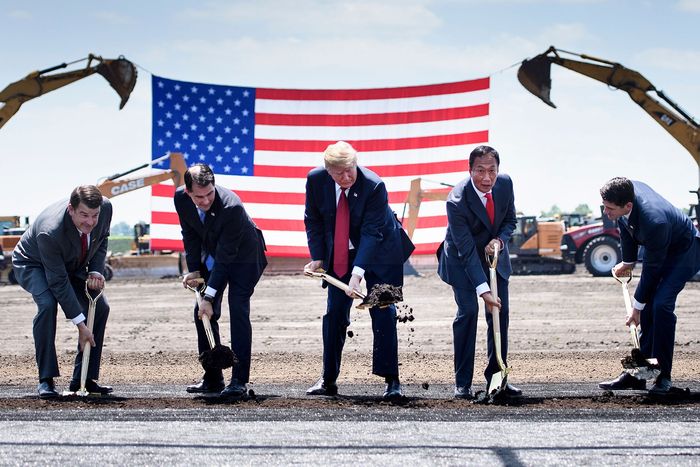
Since taking office in 2011, Wisconsin governor Scott Walker has cut his state’s K-12 education budget by nearly $1 billion dollars, slashed funding for higher education by hundreds of millions, and restricted impoverished Wisconsonites’ access to health care and nutritional assistance.
Meanwhile, he pledged more than $3 billion in public funds to Foxconn, to secure the privilege of having the Taiwanese tech company despoil Wisconsin’s wetlands and air, evict dozens of Wisconsinites from their homes, and create 3,000 jobs in the short term, and (theoretically) up to 13,000 in the long run.
This deal never made much sense in policy terms. Beyond the exorbitant subsidies — which will largely take the form of direct cash payments from taxpayers to the foreign firm (since Wisconsin already exempts manufacturing companies from taxes) — Walker also provided Foxconn with immunity from environmental regulations (including restrictions on smog pollution) and preferential treatment in the state’s court system. Which is to say: In addition to its direct fiscal cost, Wisconsin also sacrificed its citizens’ public health, and the ideal of impartial justice on the altar of bringing Foxconn to Racine.
Even if one puts those less concrete costs to the side, the Badger State wouldn’t be getting much bang for its buck. As Dan Kaufman explains in The New Yorker:
Depending on how many jobs are actually created, taxpayers will be paying between two hundred and twenty thousand dollars and more than a million dollars per job. According to the Legislative Fiscal Bureau, a nonpartisan agency that provides economic analysis to the Wisconsin state legislature, the earliest citizens might see a return on their Foxconn investment is in 2042.
…In an editorial published on UrbanMilwaukee.com, William Holahan, a professor emeritus at the University of Wisconsin-Milwaukee business school, and Charles Kroncke, a former professor at the school of business at the University of Wisconsin-Madison, calculated that if Foxconn’s taxpayer subsidies were given to random entrepreneurs, the money would generate more than ninety thousand jobs. They note that Foxconn’s plant will be twenty miles from the Illinois border, so many employees will likely not be Wisconsin residents. And, they argue, it is impossible to consider the jobs created by Foxconn a net gain, because the company’s taxpayer subsidy is taking away billions of dollars from the public sector, where it might be used to repair Wisconsin’s deteriorating roads or hire teachers to fill out short-staffed rural schools. Already, ninety million dollars from the state transportation budget has been redirected from highway work in other parts of the state for Foxconn’s development.
Remarkably, despite looking like a boondoggle from day one, Walker’s deal has somehow managed to get radically worse with time.
Since Foxconn first struck its deal with Wisconsin, it has downsized its ambitions for the new plant, opting to use it for the production of small LCD screens instead of large ones. One upshot of this change: 90 percent of the 3,000 jobs the plant will create will go to high-skill, (typically) college-educated engineers, programmers, and designers. That leaves only about 300 jobs for the Badger State’s long-suffering blue-collar manufacturing workers — and even those probably won’t be around for long: Foxconn chairman, Terry Gou, has told investors that he plans to replace 80 percent of his company’s global workforce with “Foxbots” within ten years.
But hey — there are plenty of well-educated Wisconsinites who are eager to take an exciting “knowledge economy” job in a suburb of Racine, right?
Foxconn Technology 2354 0.15% Group is considering bringing in personnel from China to help staff a large facility under construction in southern Wisconsin as it struggles to find engineers and other workers in one of the tightest labor markets in the U.S.
|
The company, the Taiwanese supplier to Apple Inc., has been trying to tap Chinese engineers through internal transfers to supplement staffing for the Wisconsin plant, according to people familiar with the matter.
Foxconn’s struggle to find qualified Wisconsonsites for the jobs it will actually create is partially a function of the state’s strong economy (something Walker could theoretically claim credit for). But it’s also a function of the fact that most Americans with coveted tech skills do not want to live in a suburb of Racine, Wisconsin — let alone a smog-filled version of it in a state with underfunded public schools and social services. As is, about 55 percent of the University of Wisconsin-Madison’s engineering-school students leave the state upon graduation.
Unfortunately for Foxconn, Racine is proving to be a hard sell to China’s knowledge workers, too.
Some engineers have expressed reluctance to relocate to Wisconsin, which is less well-known to Chinese workers than U.S. tech hubs in California or New York.
One engineer who declined to give his name said he wouldn’t want to move to a place he worried could be as cold as Harbin, a northern Chinese city known as “Ice City.”
Walker’s deal with Foxconn never made sense for Wisconsin, economically. Now, it’s no longer making sense for Walker, politically. Public opposition to the deal is strong — especially, outside southeast Wisconsin, where its meager benefits will be concentrated — and Democratic challenger Tony Evers has made attacking the agreement a cornerstone of his gubernatorial campaign. If polls prove correct, the Foxconn deal won’t even save Walker’s job.






























